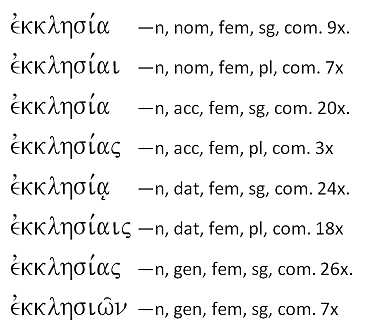Alberith Greek Wordbook ♦
Ekklesia, church, congregation, assembly, a gathering whether for religious, political or other purposes.
[GEL-139 - Mounce]

(See Case for explanation.)
Ekklesia is a feminine noun, a compound derived from the preposition ek, 'out of,' and kaleo, 'call.' The ekklesia was, therefore, the people who were called out of a particular group for a particular purpose. In ancient Greece, this referred to the citizens who were summoned to an assembly by the herald for the purpose of making public decisions. The Septuagint found this a useful word to translate the Hebrew qahal, the assembly of Israelites who were called upon to act on matters of national interest (e.g., Deut 23:2; Judg 20:2; 1 Chron 13:2; 29:1; Neh 5:13).
In the NT, we can trace its use to Jesus. Asking the disciples who men thought he was, he said to Peter (upon the latter's confession that he was the Christ), "And I tell you that you are Peter, and on this rock I will build my ekklesian, and the gates of Hades will not overcome it" (Matt 16:18). The rest of the NT has followed suit.
In recent times the matter of the "church" as being 'called out' has been questioned in some quarters mainly on the grounds that etymology does not determine meaning. The quibble, however, is pedantic. The concept that the church is "called out" is founded only upon the etymology of the word but upon its being sanctified, set apart, for God. For a useful riposte, see Wayne Jackson, "What is the Meaning of Ekklesia?" ChristianCourier.com html 
